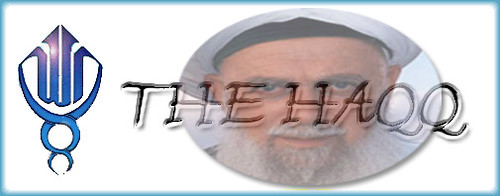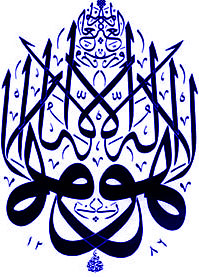The Truth

Friday, June 11, 2010
Monday, May 31, 2010
The Sufi

Until he has found what he seeks, he takes no rest, nor does he give heed to any person.
For Thy sake I haste over land and water; over the plain I pass
and the mountain I cleave and from everything I turn my
face, until the time when I reach that place where I am alone with Thee.
-Al-Hallaj
Read more!
Saturday, April 10, 2010
To be in the world but not of it
Question: What does it mean to be in the world but not of it?
Reply: Let me answer that question by telling you a story. Ibn Arabi, who is considered to be the greatest sheikh in Sufism, was traveling to Mecca, and he passed through Tunisia. In Tunisia he was told that there was a holy man living there who he must visit. This holy man was a fisherman who lived in a mud hut on the beach and caught three fish a day, no more, and he gave the bodies of these fish to poor and hungry people. He himself boiled the heads of the fish, and just ate the heads. He did this day after day, year after year. He was living the life of a monastic person, a person who has divorced himself from the world totally, and, of course, Ibn Arabi was very impressed with this discipline. So he talked to the fisherman and the fisherman asked, "Where are you going? Are you going to pass through Cairo?" Ibn Arabi nodded and the fisherman said, "My sheikh lives there. Will you please visit him and ask him for advice for me, because all these years that I have been praying and living humbly like this, I haven't received any advancement in my spiritual life. Please ask him to give me advice."
Ibn Arabi promised him that he would, and so when he arrived in Cairo, he asked the people in the city where this sheikh lived and they said, "Do you see the huge palace on the top of the hill? He lives there." So he went to this beautiful palace on the top of the hill, knocked on the door, and was received very well. They brought him into a large, luxurious waiting room, gave him food to eat, and made him comfortable. But the sheikh had gone to visit the king. And Sufis don't normally visit kings or people in high positions. It's forbidden because they can become an additional curtain between us and God, an additional attachment to the world.
While Ibn Arabi was in this luxurious room waiting for the sheikh, he looked out the window and saw a procession coming. The sheikh was riding a beautiful Arabian horse and was wearing a big turban, diamond rings, a fur coat, and had a whole honor guard of soldiers at his side, and he arrived with great pomp at the palace. But he was a very nice man, and came and greeted Ibn Arabi warmly, and they sat down and started talking. At some point in the conversation, Ibn Arabi said, "You have a student in Tunisia." And the sheikh replied, "Yes, I know." And Ibn Arabi said, "He asked for your spiritual advice." "Tell my student," the sheikh said, "If he's so attached to this world, he's never going to get anywhere."
So this was confusing to Ibn Arabi, but on his trip back, he stopped in Tunisia. He went to the fisherman there, who immediately asked, "Did you see my sheikh?" "Yes, I saw your sheikh," he replied. "What did he say?" asked the fisherman. And Ibn Arabi, looking uncomfortable, said, "Well, your sheikh, you know, he lives in great pomp and great luxury." The fisherman replied, "Yes, I know. What did he say?" So Ibn Arabi told him: "He said as long as you're so attached to this world, you are never going to get anywhere." And the fisherman cried and cried. "He's right," he said, "each day, when I give those three fish bodies to the people, my heart goes with them. Each day, I wish I could have a whole fish instead of just a head, while my sheikh lives in great luxury but doesn't care at all about it. Whether he has it or not, it doesn't touch him."
That's what it means to be in the world but not of the world. It means that, as Sufis, we are supposed to be out in the world participating in the world, but not falling in love with the world. There is a hadith [a saying of the Prophet Muhammad] that tells us: The world is your friend if it reminds you of God, and it is your enemy if it makes you forget God.
from: An Interview with Sheikh Tosun Bayrak al-Jerrahi
by Carter Phipps for "What is Enlightenment?"
Read more!
Thursday, September 04, 2008
Allah’s Light!
Bismillahir'Rahmanir'Rahmin
There was a famous orientalist who went everywhere asking questions, never satisfied with the world religions that he had studied. He came to my Master Grandshaykh Abdullah Daghestani and said, “I feel as if I am catching air. I find myself knowing more than the rabbis and priest and Islamic scholars that I questioned. I am finally coming to you and ask you for an answer. If you do not give it to me, I am going to remain without belief for the rest of my life.” And he said, “Show me God.”
My teacher said:
O my son, why do you feel that you are only catching air? If you take that seed of a fruit and plant it and water it, you will find a green sprout coming out after thirty or forty days, and if you look for the original seed in the ground you will not find it anymore. If you come back after thirty years, you will find a large tree giving fruit to everyone. If you put an egg under a chicken for twenty-one days, the inner egg disappears, only a shell remains, and a chick will come out. The sperm that Allah allows to nest in the mother’s womb, a holy place, undergoes a similar seclusion for a period of nine months to disappear completely and come out as a new generation.
God has chosen a sacred place to send His first light to humanity: the mother’s womb. For that reason women are highly honored by God. He chose them, not men to carry that light. Love in women, therefore is ninety-nine times stronger than in the hearts of men. If women bring only one more part of love in their heart, women vanish in the love of God. They have been more honored than men because they carry God’s light in their womb. Yet they suffer tyranny and oppression everywhere in this life, but Allah never accepts that women be mistreated. He loves them more for it and the first people to go to paradise are women. This is Allah’s Will from the beginning.
---------------------------------
Shaykh Muhammad Hisham Kabbani
Read more!
Thursday, December 06, 2007

Previous Posts
- Mawlana meets Pope Benedict in Cyprus
- The Sufi
- To be in the world but not of it
- Allah’s Light!
- HILYE-I SERIFE
- Women are honoured
- Melbourne Retreat Rabiul'Awwal 1428
- Mawlid Mubarak!
- Esma ul Husna
Archives
- July 2005
- August 2005
- September 2005
- October 2005
- November 2005
- December 2005
- January 2006
- February 2006
- March 2006
- April 2006
- May 2006
- June 2006
- July 2006
- August 2006
- September 2006
- November 2006
- December 2006
- January 2007
- February 2007
- March 2007
- April 2007
- November 2007
- December 2007
- September 2008
- April 2010
- May 2010
- June 2010


